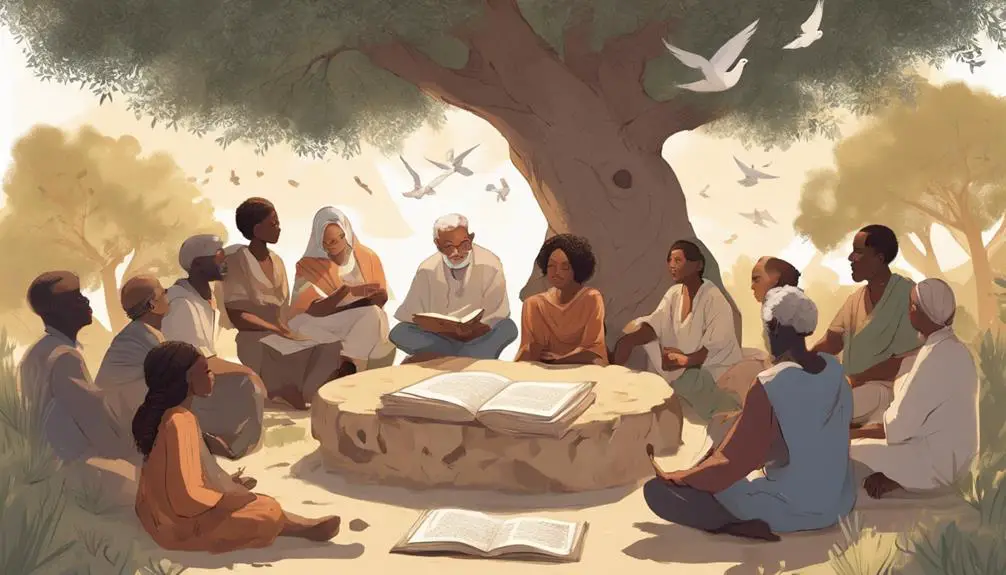From the Tower of Babel to King Nebuchadnezzar, explore how biblical tales of pride reveal timeless lessons on humility's importance.

Stories of Pride in the Bible
You might not be aware that the Bible is replete with tales not just of virtue, but also of pride and its consequences. From the architectural ambition of the Tower of Babel to King Nebuchadnezzar's haughty downfall, these stories serve as poignant reminders of humility's value.
Each narrative, whether it's Pharaoh's defiance against divine warnings, Saul's rejection as king, or Herod's grim punishment, encapsulates the peril of pride. As you explore these tales, you'll find that they not only recount historical or mythical events but also offer timeless insights into human nature and the dangers of hubris.
Why not uncover what lessons they hold for us today?
Key Takeaways
- Biblical narratives caution against pride, showcasing its potential to invite divine retribution and downfall.
- Stories like the Tower of Babel and King Nebuchadnezzar emphasize the importance of humility before divine authority.
- Pride often leads to the challenge of divine will, resulting in significant consequences as seen in the lives of Pharaoh and Saul.
- The symbolism and lessons within these stories remain relevant, urging contemporary readers to recognize the dangers of hubris and the value of humility.
The Tower of Babel

The Tower of Babel story, found in Genesis 11:1-9, serves as a poignant illustration of humanity's pride and its consequences, showcasing the collective attempt to build a monument to their own achievements and challenge divine authority. This narrative is deeply entwined with the themes of language diversity and architectural ambition, providing a rich vein of analysis for scholars and theologians alike.
At the heart of this account is humanity's architectural ambition, which isn't merely about constructing a physical edifice but also about erecting a symbol of human unity and power. The tower, intended to reach the heavens, symbolizes humanity's desire to make a name for themselves, independent of divine intervention or guidance. This architectural ambition reflects a deeper pride and rebellion against God, suggesting that human achievements and technological advancements, no matter how grand, can lead to hubris if they're pursued without regard for the divine.
Language diversity emerges as the divine response to this pride, a tool used to fracture the false unity built on human arrogance. The scattering of people and the confusion of languages serve as a reminder of humanity's limitations and the dangers of overreaching. This intervention by God not only halts the construction of the tower but also disperses humanity across the earth, creating a mosaic of cultures and languages. The introduction of language diversity is a pivotal moment that underscores the complexity of human communication and the challenges of achieving true understanding and unity.
In analyzing the Tower of Babel, one must consider how language diversity and architectural ambition are intertwined with the themes of pride, divine authority, and the consequences of human actions. This story serves as a cautionary tale, reminding us of the limits of human ambition and the importance of humility before the divine.
King Nebuchadnezzar's Downfall

Exploring another biblical narrative of pride and its repercussions, King Nebuchadnezzar's downfall vividly illustrates the perils of arrogance and the divine demand for humility. In the Book of Daniel, Nebuchadnezzar's story unfolds, revealing a king who, despite witnessing the power of God through miraculous events, succumbs to pride, leading to his ultimate downfall.
- Dream Interpretation: Nebuchadnezzar's dreams, interpreted by Daniel, serve as divine warnings. The most notable dream foretells his downfall due to pride. Despite the clear interpretations, Nebuchadnezzar's arrogance blinds him to their truth, showcasing a refusal to acknowledge a power greater than his own.
- Fiery Furnace: The king's decree to worship a golden image and the subsequent miraculous survival of Shadrach, Meshach, and Abednego in the fiery furnace further demonstrate his prideful challenge to divine authority. This event underscores his arrogance, as he positions himself above God, demanding worship through fear and power.
- Divine Humiliation: Nebuchadnezzar's pride leads to his divine humiliation. He's stripped of his throne and driven from men to live as a beast until he recognizes that 'the Most High rules in the kingdom of men.' This period of madness and animal-like existence serves as a tangible manifestation of his spiritual downfall, a direct consequence of his pride.
In a scholarly analysis, King Nebuchadnezzar's narrative serves as a cautionary tale. It underscores the destructive nature of pride and the necessity for humility before the divine. Through dream interpretation and the fiery furnace episode, Nebuchadnezzar's story eloquently articulates the biblical theme: those who exalt themselves will be humbled.
Pharaoh's Defiance

In examining Pharaoh's defiance during the Exodus narrative, we encounter a profound lesson on the dangers of obstinate pride in the face of divine warnings. Pharaoh's refusal to heed Moses' challenge, under divine directive, to let the Israelites go, sets a stage for calamity. This act of defiance isn't merely a refusal but a demonstration of Pharaoh's prideful elevation of his will above divine command.
Moses, acting as the intermediary for divine will, presents Pharaoh with a clear choice: obey and let the Israelites go, or face dire consequences. Pharaoh's response, a steadfast refusal, ignites a series of catastrophic plagues, each a testament to the severity of his prideful stance. The plagues consequence, ranging from environmental havoc to the death of the firstborn in Egypt, encapsulates the tangible repercussions of Pharaoh's defiance. Each plague escalates in intensity, symbolizing not only the physical but also the spiritual erosion that accompanies such pride.
Scholarly analysis of this narrative underscores the interplay between divine patience and human obstinacy. Pharaoh's opportunity to relent and avoid further suffering is met with increased hardness of heart, a decision that ultimately leads to Egypt's great suffering. The Exodus story, thus, serves as a cautionary tale on the perils of pride against divine admonition.
This detailed examination of Pharaoh's defiance elucidates a broader principle: pride, especially in the form of defiance against divine warnings, invites calamity. It's a timeless lesson on the importance of humility and the consequences of elevating human will above divine guidance.
Saul's Rejection as King

Saul's tenure as Israel's first king is marked by his failure to obey divine commands, leading to his rejection by God. This pivotal moment in biblical history encapsulates the dangers of pride and disobedience, especially in positions of leadership. Saul's story serves as a cautionary tale, illustrating the paramount importance of humility and adherence to divine will.
- Divine Intervention: Saul's initial appointment as king was a result of divine selection, emphasizing the expectation of divine obedience. However, his subsequent actions, particularly his disobedience in the matters of war spoils and the Amalekites, highlight a direct defiance against divine commands. This disobedience wasn't taken lightly, leading to divine intervention through the prophet Samuel to announce Saul's rejection.
- Leadership Failure: Saul's inability to follow divine instructions not only demonstrates a personal failure but also a failure in leadership. His actions had far-reaching consequences, affecting not just his reign but also the spiritual and political trajectory of Israel. This underscores the critical role of ethical and obedient leadership in maintaining divine favor and national prosperity.
- Pride's Consequence: At the heart of Saul's rejection is the theme of pride. Saul's pride, manifesting in his reluctance to fully submit to divine authority, ultimately leads to his downfall. This narrative emphasizes the destructive power of pride, especially when it interferes with divine directives and the welfare of a community.
Saul's rejection as king is a profound reminder of the importance of humility, obedience, and the dangers of leadership failure in the face of divine intervention.
Herod's Punishment

Reflecting on Saul's rejection due to pride, we now turn our attention to another biblical figure, Herod, whose severe punishment further underscores the peril of arrogance and disobedience to divine will. Herod's story, delineated in the Acts of the Apostles, epitomizes the dire consequences of hubris, particularly when juxtaposed against the divine. His acceptance of adulation as a god, rather than a mere mortal, invites divine intervention, culminating in a gruesome demise.
This narrative serves as a potent illustration of the moral lessons woven throughout biblical texts, emphasizing the imperative of humility and recognition of one's place in relation to the divine. Herod's punishment, thus, isn't merely a punitive measure but a didactic tool, underscoring the vulnerability of human power to divine judgment.
The account of Herod's end is rich in symbolic elements, accentuating the notion that divine justice is inescapable and sovereign over human authority. His demise isn't an isolated incident of divine retribution but a thematic recurrence in biblical stories, reinforcing the principle that pride precedes downfall.
Through a scholarly lens, one discerns that Herod's narrative is emblematic of the broader biblical discourse on the folly of pride. It's a cautionary tale that resonates with timeless relevance, urging adherence to humility and reverence for the divine will. In this context, Herod's punishment transcends its historical setting, offering contemporary readers profound insights into the dangers of arrogance and the inevitability of divine intervention in rectifying moral transgressions.
Frequently Asked Questions
How Does Modern Theology Reconcile the Concept of Pride in the Bible With Contemporary Understandings of Self-Esteem and Confidence?
You're navigating how modern theology bridges traditional views of pride with today's notions of self-esteem and confidence. It delves into pride origins, examining how self-awareness evolution has reshaped our understanding.
Scholars analyze pride not just as hubris but as a component of healthy self-regard. This reconciliation involves distinguishing between detrimental pride and a form of pride that fosters self-respect, aligning ancient teachings with contemporary values on personal growth and self-appreciation.
Are There Any Parables or Teachings of Jesus That Directly Address the Issue of Pride, and How Do They Complement or Contrast With the Old Testament Narratives?
Looking to avoid a prideful downfall? Jesus's parables are your go-to guide for humility lessons.
Unlike the dramatic tales in the Old Testament, Jesus's teachings offer a more nuanced approach. Through stories like the Pharisee and the Tax Collector, you're shown that pride goes before a fall, in a contrast that's as stark as it's enlightening.
It's a masterclass in balancing confidence with humility, minus the fire and brimstone.
In What Ways Have Different Christian Denominations Interpreted the Stories of Pride in the Bible Differently, Particularly Regarding Their Moral and Ethical Implications?
You'll find that interpretations of pride's moral and ethical implications vary among Christian denominations, underlining denominational disagreements. These variances arise from differing pride definitions, shaping how each sect views humility and arrogance.
Delving into these interpretations provides insight into the broader theological discourse, highlighting not just contrasts but also areas of consensus. This analytical journey reveals the complexities within Christianity, emphasizing the nuanced understanding required to grasp the full spectrum of beliefs.
How Has the Theme of Pride in These Biblical Stories Been Depicted in Christian Art and Literature Throughout History, and What Variations Can Be Seen in Those Interpretations?
You're exploring how pride's depicted in Christian art and literature, noticing a rich tapestry of interpretations.
Artistic symbolism and cultural adaptations stand at the forefront, showcasing pride's multifaceted nature.
From medieval paintings to modern novels, artists and writers have leveraged historical and cultural contexts to highlight or critique pride.
This variance underscores the complexity of interpreting a timeless theme, inviting you to ponder pride's shifting visage across eras and societies.
Can the Consequences of Pride in These Biblical Stories Be Seen as Purely Divine Intervention, or Are There Elements That Suggest Natural Consequences of the Characters' Actions and Decisions?
You're delving into whether outcomes stem from divine wrath or the natural fallout of one's choices. Pride's origins often blur these lines, showing both celestial punishment and self-inflicted wounds.
Cultural impacts shape how we interpret these narratives, suggesting a mix of both divine and natural consequences. Analyzing these tales, it's clear that pride's repercussions aren't solely heavenly decrees but also deeply rooted in the characters' actions and decisions.
Conclusion
In the tapestry of biblical narratives, pride weaves a cautionary thread, illustrating humanity's penchant for hubris. Like Icarus soaring too close to the sun, figures such as Nebuchadnezzar and Pharaoh exemplify the perilous descent that follows the intoxicating ascent of arrogance.
These stories serve as timeless mirrors, reflecting the folly of placing oneself above the divine or communal order. In their downfall, a profound truth emerges: humility is the cornerstone upon which wisdom and true leadership are built.



Sign up